Currybet's law - 5 reasons why Doctor Who always crops up in BBC meetings
When I was at the #openbbc event at Broadcasting House last week, we nearly got through the whole evening without a single mention of Doctor Who. Just at the last moment, however, someone thankfully did. This rescued my record of not having been to single BBC meeting in the last 5 years-or-so that didn't use Doctor Who as the default BBC example of...well lots of things.
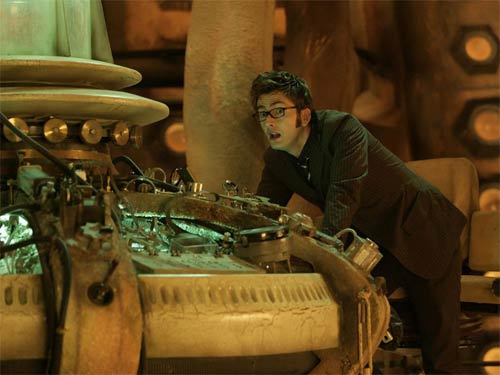
Having pointed this out on Twitter, Ant Miller suggested that it might be called Currybet's Law, which I'd articulate as:
"The more BBC staff that are present in a meeting, the probability of 'Doctor Who' being mentioned approaches one"
Now, unlike Godwin's Law, mentioning Doctor Who doesn't end a debate within the BBC.
However, I've seen it used as shorthand for lots of different things within the Corporation, and I thought it worth posting 5 reasons that Doctor Who is the obvious example BBC people use
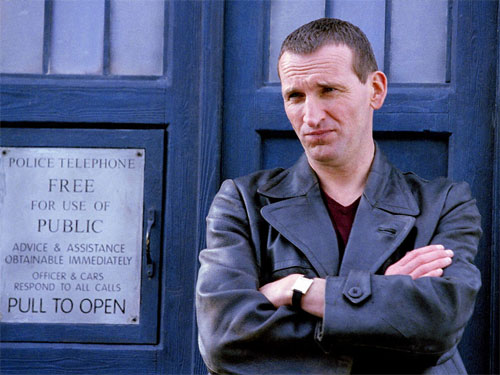
It is an example of multi-platform
Whether it was the interactive only story 'Attack of The Graske', the spoof websites that have accompanied the series, the webcasts before the revival or the online Flash games, the re-launch of Doctor Who has been a truly multi-platform experience, including radio and podcasts.
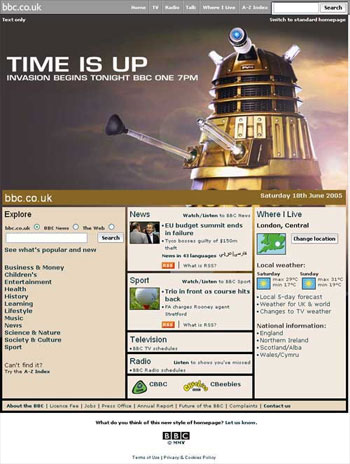
Indeed, the BBC even put on a special internal presentation about the successful multi-platform nature of the show, and the Torchwood and Sarah Jane Adventures spin-offs.

There are very few examples of true 360° commissioning, but the Doctor Who production base in Cardiff is one of them.
It is genuinely popular and critically acclaimed
I know the BBC mantra is to 'make the popular good, and make the good popular', but Doctor Who hits the holy grail of being genuinely popular and critically acclaimed. It is a programme brand almost universally loved by the British public, in a way that not many other BBC brands are. EastEnders is hugely popular, but divisive. Today is essential, but only appeals to a certain demographic, and so on and so forth. Therefore Doctor Who repeatedly crops up in meetings as something for the Corporation to aspire to.
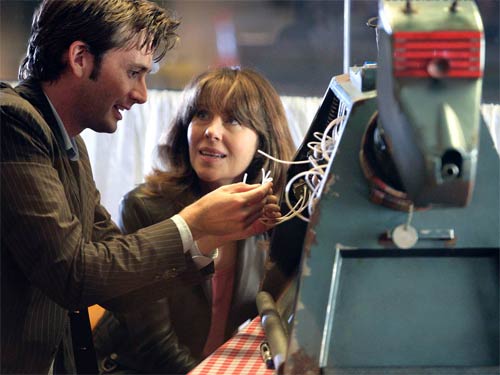
It is a heritage brand
Doctor Who has a long television history that pre-dates BBC2 and colour. This means that you can bring it up in BBC meetings in lots of contexts.
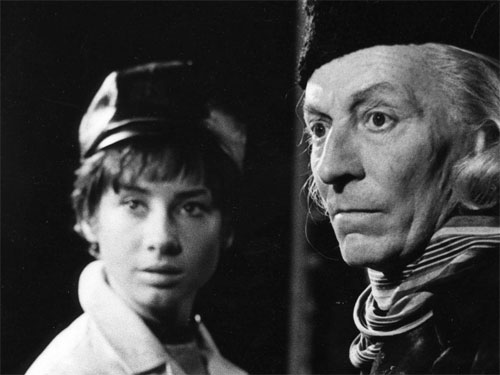
You can compare how crude the production values were in 1963 to now. You can despair that episodes were junked in the 70s as an example of why the digital preservation of everything is now sacrosanct. You can mock the hand-typed production documents from 1989 that are exposed online as PDFs.

But perhaps, more importantly, as a heritage brand, it gives the BBC hope that all of the bits of an organisation that has existed since 1922 can be reinvented and made successful for the 21st century.
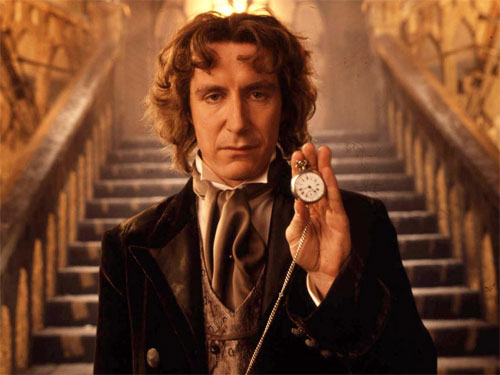
It is a commercial property
The golden rule of the relationship between the public service BBC and BBC Worldwide is 'clear blue water' between the two. The web has kind of muddied that water, because, with advertising now delivered to the international audience, you have to design the public service website in such a way that standard commercial formats can be dropped into it.
Doctor Who blurs that line even more.
The programme spawns a massive merchandising and licensing operation. There are kids who have Doctor Who toys and t-shirts, yet have never watched the show, because they are at an age where it is still deemed too scary for them by their parents. The spin-off novels in shops are legion, and there are action figures, Top Trumps, trading cards and even pub video games.
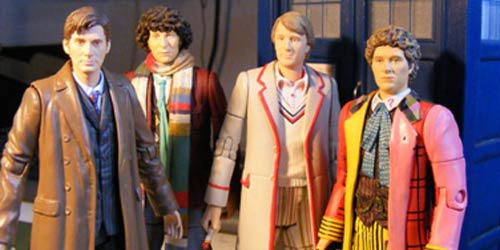
As a reference point in BBC meetings, it is a great example of a programme where decisions taken for editorial reasons have implications in the commercial sphere. I mean, let us be honest here, no merchandiser was excited about the return of the Macra in "Gridlock", but everybody wins when the Daleks or the Cybermen are on screen.
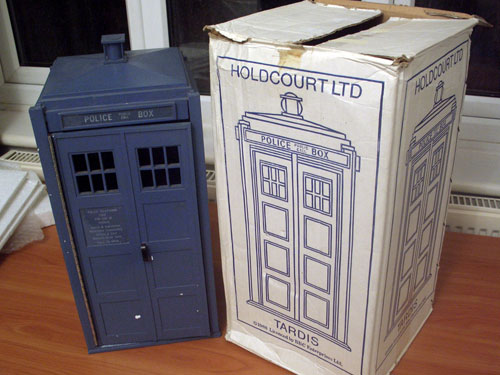
It is Doctor Who...
I reckon that one of the biggest reasons it crops up whenever I am at the BBC is because most of the people in the kind of meetings that I go to are of an age and inclination to have been exposed to either Patrick Troughton, Jon Pertwee or Tom Baker as their 'first' Doctor when they were kids.
Like me, they loved it back then, and so they love it now.
Indeed, I'm almost certain that, notwithstanding the production values and the writing and acting talent involved with the series, when it was relaunched with Christopher Eccleston, the majority of the media giving it such a warm reception were doing so based on their own fond Doctor Who memories of the sixties and seventies.
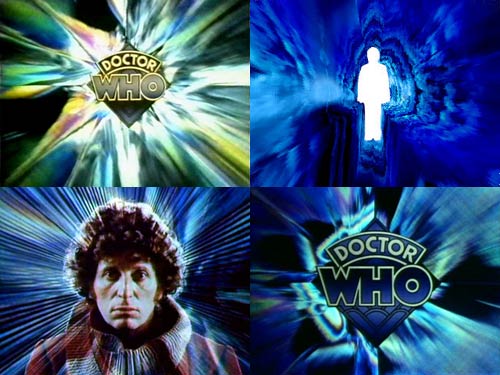
“Who’s Who? The Resurrection of the Doctor” charts how the Guardian has covered Doctor Who since it was revived in 2005. If features interviews with Christopher Eccleston, David Tennant, Matt Smith and the men in charge of the show's fortunes: Russell T. Davies and Steven Moffat. It also includes interviews with a host of other Doctor Who actors including Billie Piper, Freema Agyeman, John Barrowman and writers including Neil Gaiman and Mark Gatiss. There are contributions from legendary author Michael Moorcock, Seventh Doctor Sylvester McCoy, and specially commissioned illustrations from Jamie Lenman.
“Who’s Who? The Resurrection of the Doctor” - £2.99 for Kindle & iBooks.

Should you ever be in the area again, try and wrangle a look at the Doctor Who meeting room in the Media Centre.
It's got "wood" panelling, Doctor Who props and lots of other stuff. Perfect place for dull meetings about marketing.
I believe that DW is also a good illustration of the value of quality merchandice. When it went off air it did not disappear, it continued in the form of novels and audioplays. Such things are usually regarded as advertising material for the real product. In this case, they were the product. Against all expectation the demand for them grew over the years and they grew their own fanbase. Certain other franchises that chuck out a rubbish console game and some trading cards when their marketing department tells them to should take note.
Too much Doctor Who is why the UK cancelled their space program.
Growing up in rural Oklahoma my clique was the nerds/dweebs. But as this was the 1980's, that wasn't computer tech kids, but Dungeon and Dragons, and yes, Doctor Who. Sadly, as with my elementary education, I should have paid attention more. Learned just enough Dr. Who lingo to get by with my peer group. Now, as I try following any Doctor Who I get lost.
When you consider the popularity of DW, it is amazing that the show was ever canceled.
The show first caught my eye when I was 13 years old, and happened to find it on my local PBS channel in Chicago. This was during the time of the Third Doctor (Pertwee), and I watched faithfully all the way until the Seventh Doctor and the show's cancellation.
Yes, I saw the Fox movie with the Eigth Doctor, and went over the moon when the series was relaunched.
When you consider the INTERNATIONAL appeal of the show, is it really that surprising that a BBC meeting will have someone reference it?
It must have been quite a risky step when they first brought it back. I also loved it as a kid and was worried that it wouldn't be quite as good, it was though, and so far it has continued to be.
My kids love it too, and thinking about it they do have the odd spin off product, toys, lunch boxes etc. I wonder exactly how much money it brings in?
Even the BBC reporter giving an update on the Chilean miners' rescue described the Phoenix rescue capsule as "a TARDIS."